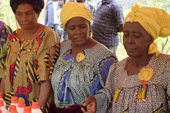Message from the director of the Western and Central Africa Division
The world is witnessing an unprecedented increase in food prices. The impact of higher prices on poor rural people in Africa is particularly profound.
Urgent measures are required. They range from short-term efforts to ensure increased access to food, to longer-term efforts to make sure farmers have the seeds and inputs they need to boost production. In the short run, the challenge is to identify ways to support African smallholder farmers in Western and Central Africa so that they can boost their productivity and production this season to take advantage of the higher prices. In the longer run, the challenge is to increase their productivity sustainably, respond effectively to growing demand over time, and improve the food security of their households and their countries.
With the right investments, policies and development programmes, rising prices are a huge opportunity for smallholder farmers. It is estimated that food production will need to rise 50 per cent by 2030 to meet growing demand. The world’s 450 million family farms can play a crucial role in meeting this demand as well as contributing to food security. For this to happen, however, they need secure access to land and water, and to microfinance to pay for seeds, tools and fertilizers. They also need roads and transportation, and technology for market information, and stronger organizations if they are to benefit from broadening markets, increased demand for products and higher prices.
IFAD is making available US$200 million to assist farmers in countries and regions hit hardest by high food prices. The money has been reallocated from existing IFAD funds and loans as part of international efforts to ease the crisis by increasing agricultural production. In Western and Central Africa, IFAD is reallocating around US$50 million as an initial response to the rise in food prices.
Investments will focus on boosting cassava, rice, maize and other cereals production starting from the next cropping season in order to help rural and urban poor people, who spend most of their income on food. Urgent actions in the short term include ensuring smallholder farmers have access to inputs (seed varieties and fertilizers) and to key resources, such as irrigation water, in time for the current growing season. IFAD is also looking at medium and long-term investments and activities to sustain and increase smallholder farmer food production in the region.
We need also to foster innovation, increase access to livelihood options, and work to increase private investments in agriculture through public-private partnerships especially to improve processing and marketing opportunities. Finally, we need to foster collaboration with governments, research institutes, civil society, farmers’ organizations, the private sector and our other development partners to improve the coherence of our actions and the effectiveness of our investments. This is where we will concentrate our efforts in the coming months.
Mohamed Béavogui
Addressing the food price situation in Western and Central Africa - a strategy for the region
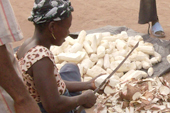 |
||
|
Boosting cassava production is one way IFAD is helping the region to address the food price surge | |
To address the food price surge, IFAD’s Western and Central Africa Division has developed a two-pronged approach based on successful value chain initiatives. In the short term, the Division will work within its portfolio in the region to increase access to seeds (multiplication and distribution of high-yielding and resilient varieties) and inputs such as fertilizer to boost agricultural production and productivity in the region.
In the medium and long term, IFAD-supported programmes, projects and initiatives will focus on improving production infrastructure and access to markets, through investments in processing, institutional and organizational development and market infrastructure building. This approach will rely on both existing projects and future programmes.
The following priority activities will guide the Division’s actions:
- accelerating the implementation of ongoing initiatives that promote food production, marketing, processing and food security (including regional initiatives such as the Regional Cassava Processing and Marketing Initiative [RCPMI])
- financing emergency provision of and access to improved seeds, inputs and agricultural equipment to promote increased smallholder productivity with a view to increasing production in the current cropping season
- reallocating resources in the context of existing country programmes and projects, and launching new initiatives to rapidly respond to the need to increase production, productivity and the efficiency of value chains
- exploring the potential to feed into and work in synergy within the framework of the Comprehensive African Agriculture Development Programme (CAADP) of the New Partnership for Africa’s Development (NEPAD)
- linking with ongoing initiatives launched by the Food and Agriculture Organization of the United Nations, the World Food Programme, the World Bank and the African Development Bank
IFAD allocates US$200 million to boost next harvest
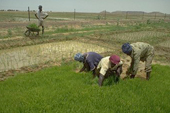 |
||
|
Seedlings of a new rice variety for transplantation in a rice paddy in Mauritania | |
On 25 April 2008 IFAD President Lennart Båge announced a loan reallocation facility of US$200 million to assist poor farmers hardest hit by high food prices. It is designed to provide an immediate boost to agricultural production in the developing world in the face of high food prices and low food stocks.
The facility allows for the reallocation of non-disbursed balances from existing loans and grants to meet immediate needs for food production. As such, farmers in the poorest countries of the world can rapidly increase their short-term agricultural output to help ease the impact of high import prices.
In Benin IFAD has financed a programme to boost agricultural production by 30 per cent and to commercialize village food surpluses. The US$680,000 intervention will support the increased productivity of short-cycle crops such as NERICA rice and maize.
In Côte d’Ivoire IFAD is supporting the government’s National Rice Programme by providing US$3 million in seeds and fertilizers for 10,000 smallholder farmers. It is expected they will produce 70,000 tonnes of rice or 35 per cent of the national programme.
In Ghana a fast track pilot initiative is being implemented to improve the effectiveness of public-private partnerships in maize and soybean value chains. This initiative has attracted approximately US$2 million additional funding from the private sector.
In Mauritania US$315,000 has been reallocated to augment food production as part of the government’s intervention programme on food prices (April-September 2008). The IFAD funds come from two existing programmes and will go towards the purchase and distribution of seeds and the establishment of cereal banks in poor rural areas.
For more information, please contact:
Karim Hussein, Regional economist
[email protected]
Useful links
- Family farms key to food security and poverty reduction in developing countries
- US$200 million from IFAD to help poor farmers boost food production in face of food crisis
- IFAD’s response to rising food and energy prices
Stories from the field
Benin: Elias Aizannon, an exceptional young microentrepreneur
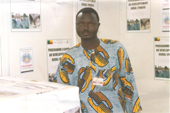 |
||
|
Elias Aizannon has built a successful business out of breeding grasscutters in Benin | |
“My name is Elias Aizannon. I was born on 3 January 1969 in Dasso, a village in the commune of Ouinhi, in southern Benin. I am married and have four children. As you can imagine, in my home country, Benin, when you settle down, you must help your extended family back in the village, taking care of the children, brothers and cousins. And above all, you must see to their education. I am therefore responsible for two other children in addition to my own. Thanks to the Income-Generating Activities Project and the Rural Development Support Programme, I was able to develop my small business and my skills. Apart from breeding grasscutters and rabbits, I’m currently training other young entrepreneurs so that they also have the opportunity to fulfil their ambitions and support their families.”
A moped mechanic by training, in 2000 Elias Aizannon received training in how to breed grasscutters in confinement. The training was provided by an NGO partner operating in the Dasso area, the Association Béninoise des Eleveurs d'Aulacodes (ABEA), as part of IFAD’s Income-Generating Activities Project (PAGER). Before the training, Aizannon lived on the sale of roosters and chickens in addition to his earnings as a mechanic. A trainer with the PAGER project suggested that he also breed grasscutters.
Aizannon says his initial reaction was: “How on earth can you raise such wild creatures at home? I can hardly believe what you’re saying!”
The trainer convinced him to try it and gave him some grasscutters. Aizannon started up his new line of business in March 2000, supported by training from the project.
The training he received included techniques for breeding grasscutters in confinement, cross-breeding, castration and fattening, and how to prevent some potential diseases and administer simple treatments (vaccinations, primary care). Aizannon also learned construction methods for pens and cages and even for grasscutter stables, bookkeeping and livestock management, grasscutter marketing techniques and management of grasscutter waste for use as organic fertilizer.
In 2004, Aizannon extended his grasscutter stable and added rabbit farming to his business, enabling him to expand and diversify his activities. Today, he sells at least 20 pairs of grasscutters and 120 rabbits a year, clearing a total profit of up to 400,000 CFA francs (US$950) – an impressive result considering the average income in the area where he lives. He has also been hired at a farm that has been set up in another area where he is paid to provide technical advice and assistance.
In January 2008, Aizannon had the opportunity to take part, along with the management team from the Rural Development Support Programme (PADER), in a workshop in Burkina Faso for IFAD’s partners in Africa. This enabled him to meet new clients and discover new markets for sale and distribution.
With his savings he has been able to buy a hectare of land to use as a field and a half hectare where he has an orchard with orange and papaya trees and a field of pineapple. He fertilizes his farm with the organic fertilizer he produces and sells to other producers. He has had a brick house built, a rarity in the village, where he has set up a new grasscutter stable using cement and sheet metal. He recently got himself a small motorbike to replace the bicycle he rode previously.
Aizannon is now regarded as an expert on the subject of grasscutter breeding. He is widely sought after. Through his energy and his drive to get ahead he has become a well-known microentrepreneur in the area.
To assist his community, Aizannon offered his services to the local vet to help vaccinate animals in the area. This has enhanced his knowledge of treatment methods, species-strengthening cross-breeding, castration, fattening and production of good-quality feed. He also trains young breeders and helps market the animals. Thanks to Aizannon, some local young people with little schooling have found an occupation – 16 of them have part-time employment and six have permanent employment.
Today, Aizannon is a resource person for PADER, and he is the pride of his community, the community trainers of the Centre de Pensée et d'Action pour un Développement Economique et Social (CPADES), a local NGO, and PADER.
Article written by Elias Aizannon, with the support of CPADES
For more information, please contact:
Dieudonné Messan, Project coordinator, PADER
[email protected]
Mohamed Tounessi, Country programme manager
[email protected]
Annabelle Lhommeau, Associate Country programme manager
[email protected]
Useful links
Cameroon: Improving rural livelihoods and food availability through potato production
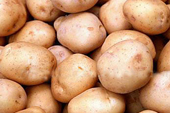 |
||
|
Seed multipliers produced 21 tonnes of potato seeds in three months with help from the PNDRT project in Cameroon | |
The Roots and Tubers Market-Driven Development Programme (PNDRT) in Cameroon is fast transforming potatoes from a subsistence crop to a cash crop. Potato farming has been going on in Cameroon for a long time. Like many other food crops, potatoes were produced mainly for home consumption, and the excess was sold on the local market. Potatoes or Irish potatoes are consumed boiled, fried as chips or pounded with beans, which is a local delicacy in the West and North West regions of Cameroon. Today, potatoes have become an export product, necessitating mass production.
Though the demand for potatoes has risen over the years, there has been no commensurate increase in production, which has resulted in a hike in market prices. The hike in prices has made many farmers interested in producing potatoes as an income-generating crop. With poor farming techniques and soil degradation, the supply has yet to catch up with the demand for the product.
PNDRT launched an initiative in the potato-producing region of Cameroon in the West and North West Provinces to boost production and commercialization. It aimed to transform the crop from a subsistence to a cash crop through mass production and marketing.
PNDRT signed a partnership agreement with a common initiative group in Fokwe, a small village in the West Province specialized in the production of potato seeds, to furnish 2 tonnes of potato seedlings, which were distributed to some 220 seed multipliers from 11 villages in the area, 70 per cent of whom were women. Three high-yield varieties – manon, cipira and spunta – were especially imported from France for the activity. PNDRT not only provided seeds, as requested by the farmers, but also trained 20 people from each of the villages in seed production.
“At first, after harvest, we left the small potatoes in the farm and that’s what we used the next year as seeds. Second, we used to plant the potatoes mixed with other crops, and in any order, and didn’t use any pesticides,” said Tsakem Daniel, potato seed multiplier in Latchouet village in the West Province of Cameroon. The result was a poor yield. But with the new farming and pest management techniques acquired from PNDRT the results have been impressive.
Within three months, the seed multipliers were able to produce 21 tonnes of potato seeds from the 2 tonnes initially distributed to them. The contract signed with the Fokwe common initiative group cost close to 5 million CFA francs, while the more than 21 tonnes produced by the multipliers is valued at about 15 million CFA francs. Other farmers are already beginning to show interest in the activity, and according to Focatchouet Tsakem Gilbert, the traditional ruler of Latchouet and President of the Latchouet Potato Multipliers Association, there is a ready market for the product. “Gabonese are already coming here asking us to sell, and other villagers are asking for the seeds to plant,” he said.
At the regional level, representatives of other IFAD-funded programmes are planning to travel to Cameroon to learn from the PNDRT experience.
The programme’s impact will not be known until the end of 2008, when it will be possible to determine the exact quantity of potatoes that have been put onto the market as a result of its efforts. However, preparations are already under way to boost the marketing of the crop and reduce losses after harvest. PNDRT has constructed warehouses in Santa and Latchouet villages to serve as market places exclusively for potatoes.
The main challenge now is to enable farmers to produce during the dry season when there is less humidity, and consequently have fewer losses after harvest. To achieve this, the farmers need to be trained in irrigation techniques and provided with irrigation equipment where necessary. “We have only one spraying machine and water pump that was provided by PNDRT. We need more spraying machines, water pumps and pesticides,” said Focatchouet Tsakem Gilbert.
In response to the farmers’ requests, PNDRT is planning to continue seed distribution and training in farming techniques in other villages, and to construct potato warehouses in six villages and provide 18 villages with irrigation equipment.
Suzanne Nke, the cassava lady
Suzanne Nke is the President of the Roots and Tubers Basin Women’s Association of Okola, a small town comprised of seven villages and located in the Centre Province of Cameroon. She is one of the first people in the area to have benefited from the training in cassava production offered by the Roots and Tubers Market-Driven Development Programme (PNDRT). “We started by multiplying the cassava cuttings and now our objective is to increase the farms,” she says. Currently the women of her association have 10 hectares of cassava farm in each of the seven village coordination committees (comité villageois de concertation - CVC), with an objective to establish 100 hectares of cassava farms in each CVC. At the moment the cassava is processed artisanally into cassava sticks, starch and gari, but Suzanne Nke would like to get the equipment needed to process it at a semi-industrial or even industrial level. Thanks to her cassava activities, Suzanne Nke says she is well respected within the community and able to help her husband support their family. “People interested in cassava cultivation from other areas come to me for advice on how to acquire and plant new high-yield cassava varieties,” she says. She is often invited to take part in important policy meetings on cassava production, processing and marketing. Her wish now is to see the processing and marketing components of programmes such as PNDRT reinforced in order to increase cassava producers’ incomes. |
||||||||
For more information, please contact:
Abdoul Wahab Barry, Country programme manager
[email protected]
Thomas Ngué Bissa, Programme coordinator
racines&[email protected]
Useful links
Chad: Increasing access to water and to health-care facilities for sustainable development
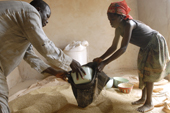 |
||
|
Like this cereal warehouse in Niger, village warehouses in Chad ensure that people have food even during periods of scarcity | |
IFAD’s approach towards promoting rural development in Chad includes promoting increased agricultural productivity, access to water and health care, microfinance and boosting the marketing of agricultural products. The country is characterized by climatic variations, particularly drought, which often have a devastating effect on harvests of staple foods such as millet, sorghum, rice and maize. The priorities of IFAD-supported projects are determined by the people participating in them.
In North Guera, project participants identified the need for 220 water points. It is difficult to dig viable wells in the region. The mid term-review of the Food Security Project in the Northern Guera Region (PSANG II), which took place in September and October 2007, found that the project has so far drilled about 60 water points. The Duba-type manual pumps most cherished by the population were installed with assistance from the Belgian government. In addition, about 20 wells have been dug or rehabilitated. PSANG II is now supporting the drilling of about 100 more water points.
“We are the primary beneficiaries of the project since mostly women and children fetch water in homes,” said Hawa Dalliam, a beneficiary of the project in Bitkine village. “We no longer go long distances to fetch water and no longer fear as much for the health of our children because of bad water.”
To ensure that families have a constant supply of food, even during periods of scarcity, PSANG II established cereal warehouses in villages where people in need of food can borrow cereals and pay the warehouses back after harvest. This initiative has been warmly received by the villagers, as testified by Sadiya Ahmat, a beneficiary in Mangalmé village. “With the lending of cereals our family has something to eat in times of difficulty. My husband and I no longer have to go to work on people’s farms in order to have something to eat. We can now prepare our farms in time,” she said.
PSANG II has worked in collaboration with the National Centre for Nutrition and Food Technology to improve the nutritional habits of the people. They trained and equipped peer educators selected from some 214 villages, beyond the 100 originally earmarked for the project, to educate the women about breastfeeding, the various classes of food, making enriched pap out of local products, the vaccination calendar for children, pre-natal consultations and techniques for filtering water. PSANG II has put in place an internal mechanism where women in dire need will be systematically identified and referred to health-care centres or given an economic activity to carry out so as to improve their food security.
The recent review of the results achieved so far implies that child malnutrition has dropped significantly since the project started its activities in 2004, when the level of acute child malnutrition averaged 12.5 per cent. A survey is currently being organized to verify the project’s impact on alleviating child malnutrition.
For more information, please contact:
Naoura Deli, Project coordinator
[email protected]
Hamed Haidara, Country programme manager
[email protected]
Useful links
Congo: Pest-free varieties increase popular interest in cassava production
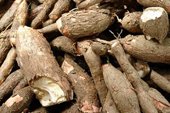 |
||
|
The introduction of pest-free varieties has increased cassava production in Congo | |
New pest-free cassava varieties introduced by the Rural Development Project in the Niari, Bouenza and Lékoumou Departments (PRODER-Sud) have aroused the interest of farmers. Members of the association Mpika GIEC (groupement d’intérêt économique communautaire) say that at first people used to laugh at them because they did not gain anything from their work. Today they see more interest from people as the cassava cuttings are growing well on the experimental farms, especially the foreign species. The plants are without scars. People have asked the PRODER-Sud project to extend the multiplication of improved cuttings to the whole village so that everyone can benefit.
PRODER-Sud works to improve cassava production in Congo. Its overall objective is to increase the incomes and food security of poor rural people in vulnerable communities in the Niari, Bouenza and Lékoumou Departments of southeast Congo. In collaboration with the agronomic research centre in Loudima and technicians from the Ministry of Agriculture and Grazing, PRODER-Sud introduced five new varieties in addition to two local varieties in order to see which ones did well. Experimental farms were set up with the help of local communities to multiply the cassava cuttings. About 70 per cent of the harvested cuttings were given back to PRODER-Sud for eventual redistribution to producers in the other areas covered by the project and the rest to members of the Mpika GIEC association for individual and collective farms. The Mpika GIEC association comprises some 27 members.
Before the pests, farmers used to obtain 100 to 110 bags of cassava flour per hectare. With the pest, it was difficult to obtain even 25 bags of flour. Now, the members of the Mpika GIEC association are optimistic that the introduction of the new pest-free cassava varieties will lead to a complete eradication of the pest and consequently lead to an increase in production.
For more information, please contact:
Luyaku Nsimpasi, Country programme manager
[email protected]
Paul Bizibandoki, Project coordinator
[email protected]
Useful links
Senegal: African farmers urgently need seeds
 |
||
|
Ousmane Ndiaye says the immediate problem facing producers in the region is the lack of seeds for the next crop year | |
Ousmane Ndiaye, Director of the Senegalese Association for the Promotion of Small Development Projects (ASPRODEB) and a representative of producer organizations, shares his thoughts on food price increases.
Q: A new value chain development project in Senegal is being formulated just when food prices are in the headlines all over the world. In your opinion, are soaring prices in African markets a boon or a threat to small producers?
O. N.: I don’t believe that the price increases are a total disaster or a matter of bad luck. They could even be beneficial, but certainly not in the short term. Senegal is badly affected by the situation because, like many other countries in Africa, it hasn’t been able to put in place agricultural policies that can mitigate the effects of this crisis, which is largely due to external factors.
Today, no one doubts the need for food security and consequently the need to invest in agriculture. The problem right now is knowing how to invest and for whose profit! That is what we’re going to have to discuss from now on. What matters today is saving as many people as possible from famine. That, more than its policy on targeting, will be the real challenge for IFAD to take up. Urgent interventions are needed to avoid a catastrophe in Africa. The real problem today is that a large majority of producers lack seeds for the next crop year. There is therefore a strong risk that they won’t be able to produce for the 2008/2009 crop year. However, within this group, many are already having trouble making ends meet and, in the current situation, can barely count on one meal a day. This situation is not widespread, but it affects a large share of this group. Others in the group are on the verge of running out of stock. This is because it was a bad winter. Take groundnuts, for example: last year 200,000 tonnes were produced in Senegal; this year, only 50,000 tonnes have been produced. This downward trend can be seen in all of the cereal crops because the rainy season started late and ended earlier than usual this year, and the rainfall was poorly distributed.
Q: What are the other challenges faced by Senegalese producers who are members of your association?
O. N.: Admittedly, the partnership between ASPRODEB and the Government of Senegal has had its ups and downs.
With regard to policy dialogue, we have run into some problems. Today there are few spaces for dialogue with the Senegalese authorities, far fewer today than before 2000. However, the producer associations are well prepared to take part in this dialogue. They have been operating for more than two decades; they have well-informed leaders; they have information at their disposal to formulate their proposals; and, finally, there is a national framework for dialogue, the National Council for Rural Dialogue and Cooperation. The producer organizations can therefore confer with each other and articulate their positions.
Nonetheless, given the constantly changing global environment, if we are to develop relevant positions, conduct lobbying campaigns, mobilize producers and negotiate with the State, its partners and its departments, then skills and resources are needed. And not just financial resources but also time – time to share points of view with producers, to obtain consensus.
This is a process that we must learn to control. Our main constraints are linked to various factors: time; government and partner agendas that frequently do not place the need for democratic consultation with producer organizations among their main concerns; and money, which is needed to ensure that our positions are developed and heard.
All the same, the general context is favourable for us. We have a certain experience within our organization. We have leaders. We have a structured framework within which to organize our activities.
Q.: What is ASPRODEB’s raison d’être?
O. N.: The association was set up by national federations of farmers’, fishers’ and women’s organizations. Since its creation in 1995, it has been asked to take over the management of the World Bank’s Small Rural Projects programme. To implement the activities entrusted to the association, its managers – producer organization leaders – decided to set up a professional association. This project was completed in 1999 to the full satisfaction of the World Bank and the Government of Senegal. The managers of ASPRODEB decided to continue this work. Today, we work with other United Nations agencies and with the European Union. ASPRODEB implements government projects for producer organizations in Senegal. It is currently implementing a component of the second phase of the Agricultural Services and Producer Organizations Project (PSAOP-II), jointly financed by the World Bank and IFAD.
For more information, please contact:
Ousmane Ndiaye
[email protected]
Useful links
- Senegalese Association for the Promotion of Small Development Projects (ASPRODEB)
- IFAD in Senegal
- Rural poverty in Senegal
News and events
IFAD Vice-President meets officials in Cameroon and participates in first African Scientific Week
 |
||
|
Kanayo F. Nwanze (left), IFAD Vice-President and Ephraim Inoni, Prime Minister of Cameroon in Yaoundé on 13 June 2008 | |
IFAD’s Vice-President, Kanayo F. Nwanze visited Cameroon from 9 to 14 June 2008 and had productive meetings with a number of leading Cameroon government officials. He was leading an IFAD delegation, including Mohamed Béavogui, Director of the Western and Central Africa Division and Abdoul W. Barry, Country Programme Manager for Cameroon.
They met with Ephraim Inoni, the Prime Minister and head of the Government of Cameroon, Jean Nkuete, the Vice Prime Minister, Minister of Agriculture and Rural Development, Yaouba Abdoulaye, Minister delegate to the Minister of Economy, Planning and Regional Development and Essimi Menye, the Minister of Finance. The meetings were aimed at improving collaboration between IFAD and the Government of Cameroon and ensuring that IFAD-funded programmes and projects have a greater impact on the lives of poor rural people.
Nwanze also visited Nkenglikok, an IFAD target village, to meet participants of the Community Development Support Project, the Roots and Tubers Market-Driven Development Programme, and the IFAD-funded regional Tree Domestication Programme grant entrusted to the World Agroforestry Centre (ICRAF). During this visit, he called for increased and more efficient use of resources.
Nwanze took advantage of his stay in Cameroon to meet the heads of United Nations agencies in Cameroon. He stressed the importance of enhanced cooperation among the agencies in line with the One UN initiative. He called on the different UN agencies to complement each other but maintain their own specificity in order to have a greater impact on the ground.
Prior to these meetings, Nwanze delivered the keynote speech of the first African Scientific Week and the 8th General Assembly meeting of the West and Central African Council for Agricultural Research and Development (WECARD) held in Yaoundé, Cameroon on 9 June. He reiterated the importance of agricultural research and outlined IFAD’s role in promoting research that helps farmers in developing countries adapt to new challenges.
For more information, please contact:
Abdoul W. Barry, Country programme manager
[email protected]
Useful links
Development actors agree to build partnerships and promote innovation in Western and Central Africa
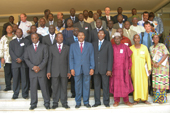 |
||
|
A hundred participants from 15 countries in the region attended the IFAD Innovation Workshop and Fair in Ouagadougou | |
More than 140 people attended the recent Innovation Workshop and Fair in Ouagadougou, Burkina Faso, organized by IFAD’s Western and Central Africa Division from 23 to 26 June 2008.
Participants ranged from farmers, producers and their organizations to representatives of the private sector and national governments. There were also representatives from regional institutions such as the West African Economic and Monetary Union (WAEMU), the Economic Community of West African States (ECOWAS), the Permanent Interstate Committee on Drought Control in the Sahel (CILSS), development agencies and leaders and participants from 15 IFAD projects.
During the four-day event, participants discussed 27 innovations developed by projects, programmes, farmers’ organizations and research and development institutions. The workshop aimed at establishing partnerships between participants in order to promote innovation and respond to emerging challenges, such as climate change and soaring food prices. The fair, which included 17 stalls and exhibits, allowed participants to disseminate information, share their experiences and interact with each other.
The opening ceremony was chaired by Alain Bédouma Yoda, Minister of State and Minister of Health representing the Prime Minister. “Innovation is the solution to agriculture and food problems faced by the region,” Minister Yoda said. Four Burkina Faso government ministers, including Laurent Sedogo, Minister of Agriculture, Water and Fisheries Resources, and Sékou Ba, Minister of Animal Resources also participated in the opening session. El Hadj Abdou Sakho, acting President of WAEMU, was also present at the ceremony.
Addressing the workshop participants, Mohamed Béavogui, Director of IFAD’s Western and Central Africa Division, stressed the need for innovation scouting and sharing, particularly in the context of climate change, and higher food and energy prices. He called for a renewed effort from all the partners in the IFAD Scouting and Sharing Innovation (SSI) Initiative to achieve these objectives.
On the last day of the workshop, awards were given to three innovations.
Louis Djilemo, an agronomist working with the Roots and Tubers Market-Driven Development Programme in Cameroon, received the prize for the best innovation in the category of technological innovation. He had developed an oven to dry fermented cassava that made the drying process more efficient and reduced smoke emissions.
The prize for the best institutional and organizational innovation was granted to the Ivorian farmers’ organization Association Nationale des Organisations Professionnelles Agricoles de Côte d’Ivoire (ANOPACI) for its economic and strategic community-based management information technology system developed around the concept of rural village information points.
The prize for the best innovation in the category of policy innovation went to the United Nations Development Fund for Women (UNIFEM) for its programme and tools to mainstream the gender dimension into the workplans and budgets of ministries of agriculture and rural development in the region.
FIDAfrique, the Sahel and West Africa Club and IFAD will continue to run the e-survey, launched with the SSI Initiative in October 2007, over the coming weeks to allow participants to further discuss the outcomes of the workshop and fair. Comments may be sent to: [email protected].
FIDAfrique has also established a web page to host summaries of the innovations identified and shared at the event, background documents, the e-survey, presentations and other core materials. The workshop report and a summary of the e-survey will be produced and disseminated across the region. Participants agreed to organize a range of events to identify and share innovations in Western and Central Africa, feeding into a major regional event every two to three years.
For more information, please contact:
Karim Hussein, Regional economist and coordinator of the Scouting and Sharing Innovation Initiative in PA
[email protected]
Coordinating unit: [email protected]
Useful links
- All information on the WCA innovation event: http://www.fidafrique.net/rubrique735.html
- http://www.fidafrique.net/article1660.html
- http://www.fidafrique.net/rubrique736.html
- IFAD’s Innovation Strategy
- IFAD’s Strategic Framework 2007-2010
- SSI documentary resources
- SSI electronic survey
- SSI overview and goals
New studies on cassava online on FIDAfrique
IFAD’s Regional Cassava Processing and Marketing Initiative and FIDAfrique have recently published online two of the initiative’s latest works to support the development of the cassava industry in Western and Central Africa.
A database on cassava equipment manufacturers in Cameroon and Nigeria and their prototypes is now available. The information on Nigeria was kindly made available by the International Institute of Tropical Agriculture (IITA). Soon the database will provide similar information for Benin and Ghana.
A study carried out from January to May 2008 on trade potentials of cassava derivatives from Western and Central Africa on ethnic markets in selected countries in the European Union (Belgium, France and the United Kingdom) is available on FIDAfrique’s website. The study is innovative in its approach and carries interesting information for cassava operators in the Western and Central Africa region.
The database and study are available in French only.
For more information, please contact:
Andrea Serpagli, Coordinator of the Regional Cassava Processing and Marketing Initiative
[email protected]
Useful links
- First RCPMI meeting of IFAD-funded roots and tubers projects
- Improving marketing strategies in Central and West Africa
- Regional Cassava Processing and Marketing Initiative

